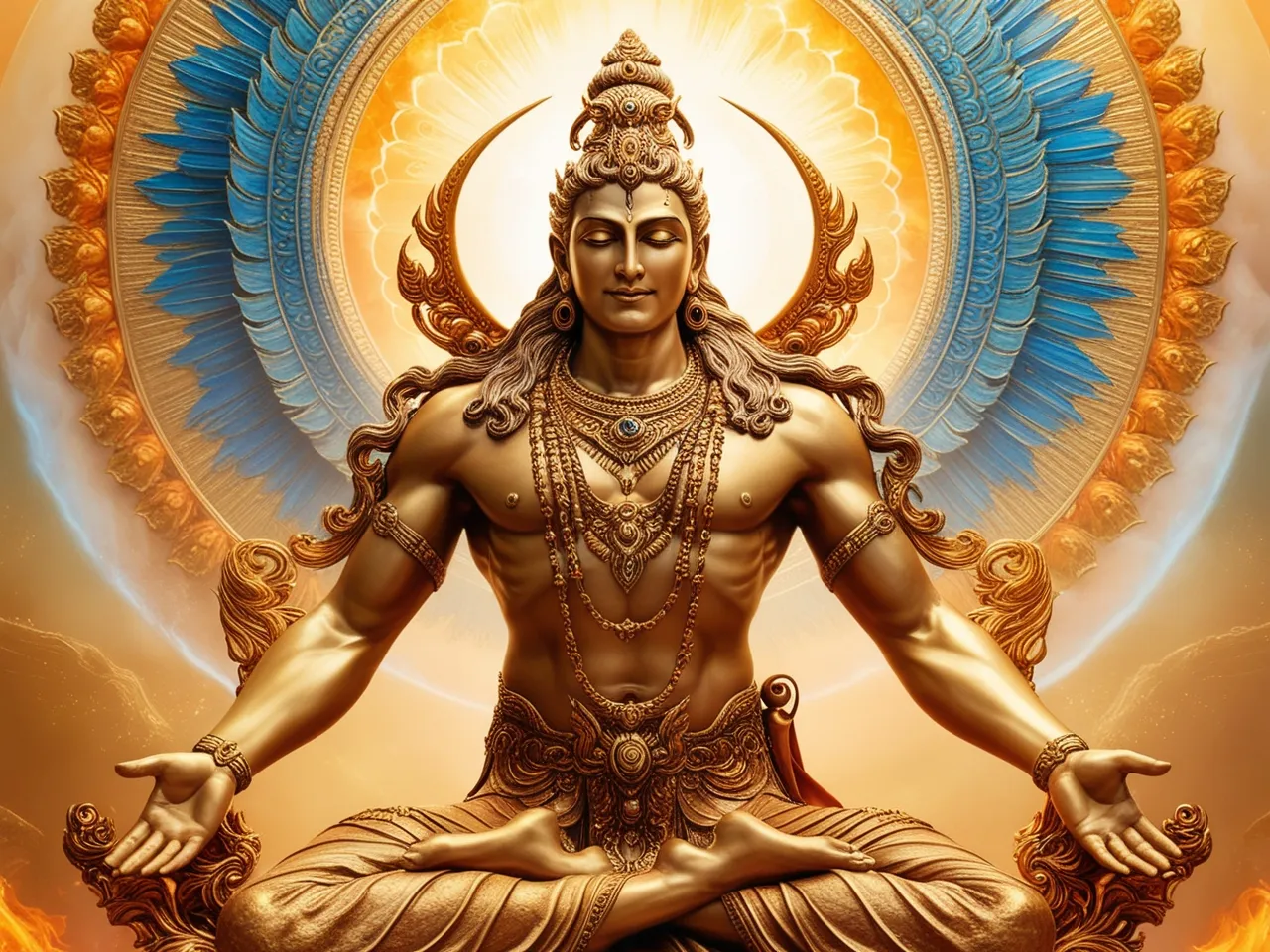The question “Who created God?” has perplexed philosophers, theologians, and curious minds for millennia. This profound inquiry delves into the very nature of existence, causality, and the concept of a supreme being. In this comprehensive exploration, we’ll examine various perspectives on this age-old question, from religious and philosophical viewpoints to scientific theories and logical arguments.

Understanding the Concept of God
Before we can address the question of God’s origin, it’s essential to define what we mean by “God.” In monotheistic religions like Christianity, Islam, and Judaism, God is typically conceived as:
- Omnipotent (all-powerful)
- Omniscient (all-knowing)
- Omnipresent (present everywhere)
- Eternal (existing outside of time)
- The creator of the universe
These attributes are crucial to our discussion, as they inform the various arguments and counterarguments surrounding God’s existence and origin.

The Infinite Regress Problem
One of the primary challenges in answering “Who created God?” is the infinite regress problem. This philosophical conundrum suggests that if everything needs a creator, then God must also have a creator. However, this leads to an endless chain of creators, each requiring their own creator ad infinitum.
To address this issue, various arguments have been proposed:
- The First Cause Argument
Also known as the cosmological argument, this perspective posits that there must be an initial, uncaused cause that set the universe in motion. Proponents argue that God serves as this first cause, existing outside the chain of causality.
- The Necessary Being Argument
This argument suggests that God is a necessary being, existing by the very nature of His essence. As such, God doesn’t require a creator, as His existence is self-explanatory and logically necessary.
- The Eternal God Concept
Many religious traditions view God as eternal, existing outside of time and space. From this perspective, the question of God’s creation becomes irrelevant, as God has always existed and will always exist.

Religious Perspectives on God’s Origin
Different religious traditions offer varying explanations for God’s existence and origin:
Christianity
Christian theology generally holds that God is eternal and uncreated. The Bible states in John 1:1, “In the beginning was the Word, and the Word was with God, and the Word was God.” This passage suggests that God existed before the creation of the universe.
Islam
In Islamic thought, Allah (God) is considered to be eternal and self-subsistent. The Quran states in Surah Al-Ikhlas: “Say: He is Allah, the One and Only; Allah, the Eternal, Absolute; He begets not, nor is He begotten; And there is none like unto Him.”
Hinduism
Hinduism presents a more complex view of divine origin. While some schools of thought consider Brahman (the ultimate reality) to be eternal and uncreated, others propose cyclical creation and destruction of the universe, including divine beings.
Buddhism
Buddhism, in its original form, doesn’t focus on the concept of a creator god. Instead, it emphasizes the cycle of rebirth and the path to enlightenment. Some Buddhist traditions, however, do incorporate divine beings into their cosmology.

Philosophical Arguments
Philosophers throughout history have grappled with the question of God’s origin, offering various perspectives:
- Ontological Argument
Proposed by St. Anselm in the 11th century, this argument suggests that God is “that than which nothing greater can be conceived.” As such, God must exist in reality, not just in the mind, as existence in reality is greater than existence in thought alone.
- Transcendental Argument
This approach, popularized by philosopher Immanuel Kant, argues that the existence of God is necessary for rational thought and moral behavior. Without God, the argument goes, we couldn’t trust our own reasoning or have a basis for objective morality.
- Fine-Tuning Argument
Also known as the teleological argument, this perspective suggests that the precise conditions necessary for life in the universe indicate a divine designer. Proponents argue that the complexity and fine-tuning of the cosmos point to an intelligent creator.

Scientific Perspectives
While science cannot directly address the existence or origin of God, it does offer insights into the nature of the universe and its beginnings:
Big Bang Theory
The prevailing scientific model for the origin of the universe, the Big Bang theory, proposes that the universe began as an infinitely dense singularity about 13.8 billion years ago. While this theory explains the expansion and evolution of the universe, it doesn’t address what came before or caused the Big Bang.
Quantum Fluctuations
Some physicists propose that quantum fluctuations in a pre-existing vacuum state could have given rise to the universe. This concept challenges traditional notions of causality and could potentially explain the universe’s origin without the need for a divine creator.

Multiverse Theory
The idea of multiple universes or a multiverse has gained traction in recent years. This theory suggests that our universe is just one of many, potentially infinite, universes. In this context, the question of God’s creation becomes even more complex, as it raises the possibility of multiple divine beings or a meta-God responsible for creating multiple universes.
Logical Arguments and Counterarguments
Several logical arguments have been proposed to address the question of God’s origin:
The Ontological Paradox
This paradox suggests that if God is all-powerful, He should be able to create Himself. However, this leads to a logical contradiction, as something cannot create itself before it exists.
The Problem of Infinite Attributes
If God possesses infinite attributes (omnipotence, omniscience, etc.), it becomes challenging to conceive of a being capable of creating such an entity. This argument suggests that God’s existence must be self-explanatory or necessary.

The Complexity Argument
Some argue that a being capable of creating the universe must be even more complex than the universe itself. This raises the question of how such a complex being could come into existence without a creator.
Anthropic Principle
This principle suggests that the universe appears fine-tuned for life because if it weren’t, we wouldn’t be here to observe it. This perspective challenges the need for a divine creator by proposing that our existence is a result of the specific conditions of our universe, rather than evidence of design.
Cultural and Historical Perspectives
The question of God’s origin has been addressed in various cultures throughout history:
Ancient Greek Philosophy
Greek philosophers like Plato and Aristotle grappled with the concept of a prime mover or an uncaused cause, laying the groundwork for later theological and philosophical discussions.

Eastern Philosophies
Many Eastern traditions, such as Taoism and certain schools of Hinduism, view the ultimate reality as an impersonal force or principle rather than a personal god. This perspective shifts the focus from a creator to the nature of existence itself.
Indigenous Beliefs
Many indigenous cultures have creation myths that explain the origin of the world and divine beings. These stories often involve multiple gods or spirits, complicating the question of a single creator’s origin.
Modern Atheistic Perspectives
Some contemporary atheist thinkers argue that the question “Who created God?” highlights the logical inconsistencies in theistic beliefs. They suggest that attributing the universe’s creation to God merely pushes the question of origin back one step without providing a satisfactory answer.
Agnostic Approach
Agnosticism acknowledges the limitations of human knowledge and understanding when it comes to questions of divine origin. Agnostics argue that the nature and origin of God, if such a being exists, may be unknowable to human minds.

Implications and Reflections
The question “Who created God?” has far-reaching implications for our understanding of:
- The nature of existence
- The limits of human knowledge
- The relationship between faith and reason
- The role of mystery in spiritual and philosophical inquiry
Regardless of one’s personal beliefs, engaging with this question can lead to:
- Deeper critical thinking skills
- Greater appreciation for diverse perspectives
- Enhanced understanding of philosophical and theological concepts
- A more nuanced view of the relationship between science and religion
Conclusion
The question “Who created God?” remains one of the most challenging and thought-provoking inquiries in human history. While definitive answers remain elusive, exploring this question from various religious, philosophical, and scientific perspectives can enrich our understanding of existence, causality, and the nature of the divine.

As we continue to push the boundaries of human knowledge and explore the cosmos, new insights may emerge that shed light on this age-old question. In the meantime, the inquiry itself serves as a powerful catalyst for intellectual growth, spiritual reflection, and cross-cultural dialogue.
Whether one believes in a divine creator, multiple gods, or no god at all, grappling with the question of God’s origin invites us to contemplate the profound mysteries of existence and our place in the universe. As we navigate these complex waters, we may find that the journey of exploration is just as valuable as any destination we hope to reach.











